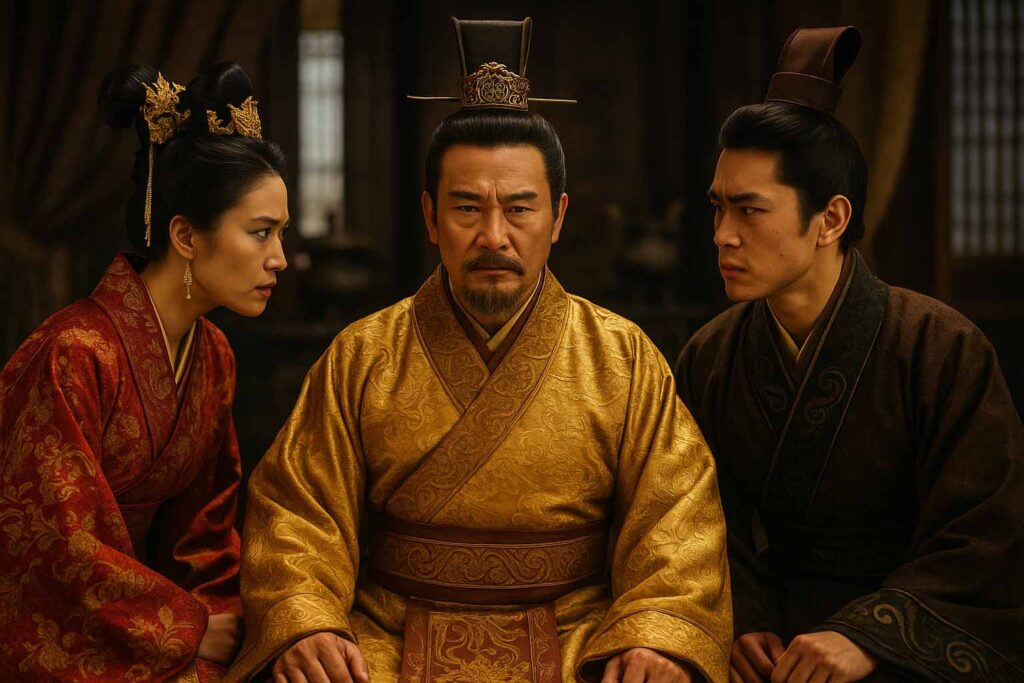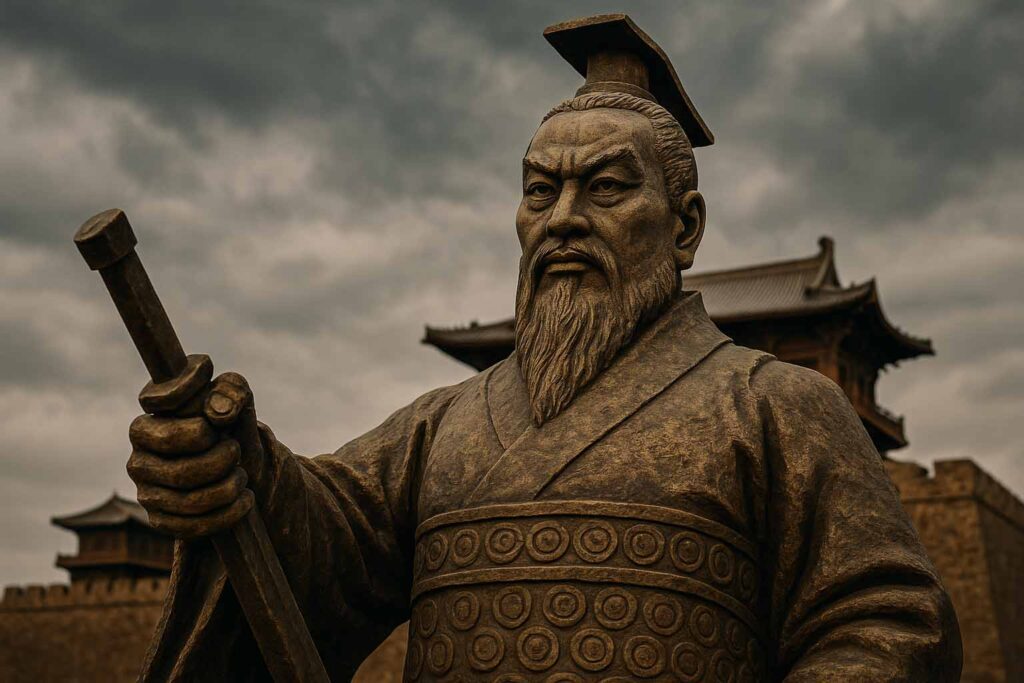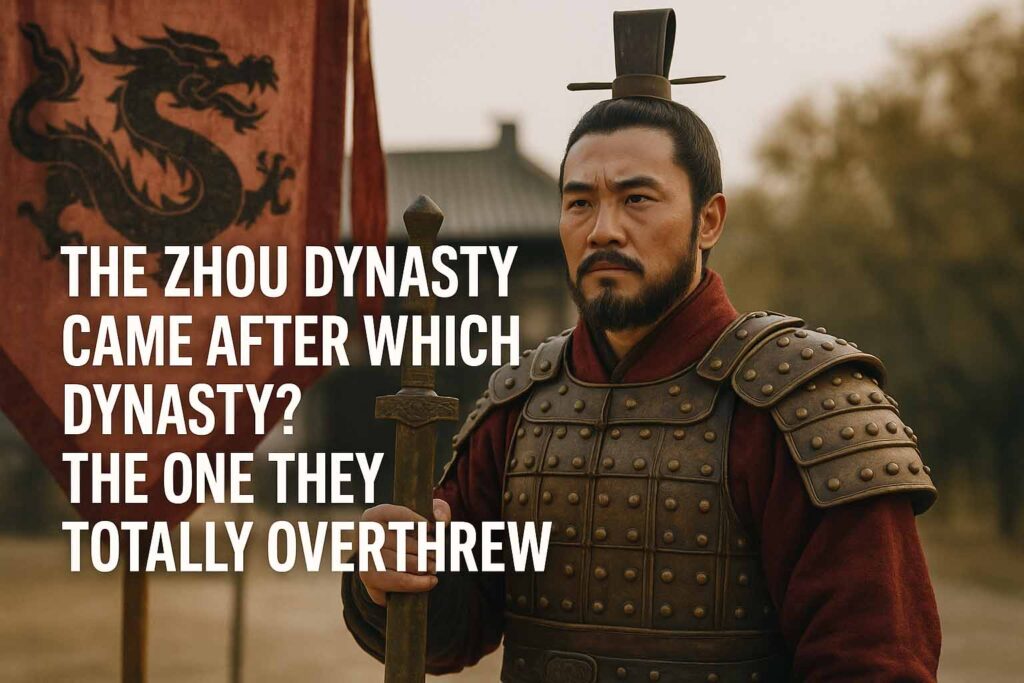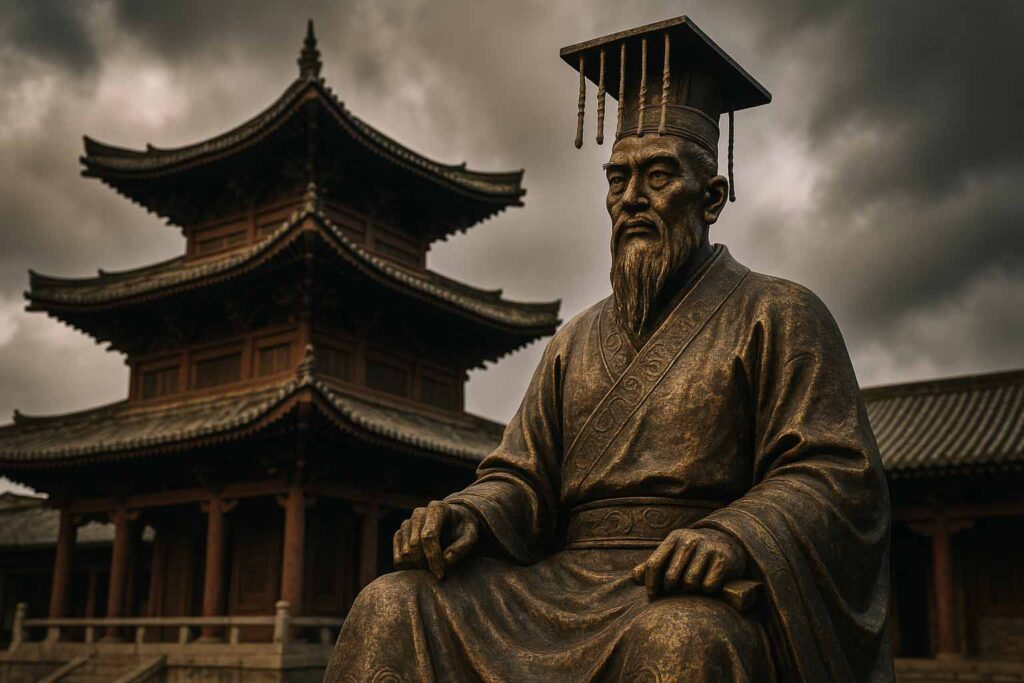It’s not just a phase, mom—it’s the foundation of Chinese civilization.
1️⃣ Ancient China 101: The Family Edition
TL;DR:
In the Zhou Dynasty (c. 1046–256 BCE), family wasn’t just about who you ate dinner with. It was a rigid, patriarchal hierarchy where everyone had a specific role, Dad was the undisputed boss, and your long-dead ancestors still expected you to do your chores.
What Actually Happened:
- The Patriarch Rules All: The oldest male (usually Dad or Grandpa) was the CEO of the family. He controlled all property, made all major decisions, and his word was law. No ifs, ands, or buts.
- Filial Piety is Everything: This was Commandment #1: respect, obey, and care for your elders. Talking back wasn’t just rude; it was a cosmic-level offense against the natural order of things.
- Ancestor Worship (The Ghostly Roommates): Your ancestors weren’t gone; they were just… invisible and judging you. Families made offerings of food and wine to keep their ancestors happy, believing they could influence the family’s fortune from beyond the grave.
- Marriage = A Business Merger: Forget romance. Marriages were arranged by parents to forge alliances and secure the family line. A woman left her own family to join her husband’s, where her main job was to produce a male heir.
- Strict Gender Roles: Men handled public life, government, and farming. Women managed the household, raised the children, and were expected to be virtuous and obedient. This system was the core of Zhou dynasty family life.
Why It Mattered:
These family structures and the concept of filial piety became the absolute bedrock of Chinese society. Philosophers like Confucius later took these ideas from the Zhou dynasty family life and turned them into a moral and political philosophy that shaped China for over 2,000 years.
Bonus Fun Fact:
When a father died, his eldest son was expected to mourn him by living in a simple mourning hut for three years, avoiding music, fancy food, and any kind of celebration. Talk about a long timeout.
Oversimplified Rating: 👴👴👴👴👴 Maximum “Respect Your Elders” Level
2️⃣ You Think Your Family’s Complicated? Welcome to the Zhou Dynasty
The Zhou Dynasty holds the record for the longest-ruling dynasty in Chinese history, and it didn’t manage that by letting everyone do whatever they wanted. Order was everything, and that order started at home. The structure of the state was seen as a macro-version of the family. If the family was chaotic, the empire would be too. Let’s dive into the details of the Zhou dynasty family life.
The Blueprint: Why Family Was the Whole Game
When the Zhou overthrew the preceding Shang Dynasty, they needed a good reason to justify their rule. They came up with the “Mandate of Heaven,” the idea that a just and virtuous ruler had the divine right to govern. This put immense pressure on the king to be morally upright.
This ideology of moral hierarchy trickled down into every aspect of society, most importantly, the family. The family unit, or jia (家), was a microcosm of the state. The father was the king of his little household kingdom. His authority was absolute, just like the emperor’s. If every family was orderly and harmonious, with everyone knowing their place and respecting their superiors, then the state itself would be stable and prosperous. Family wasn’t a private affair; it was a pillar of political stability.
Meet the Cast: The Roles in Zhou Dynasty Family Life
Life in a Zhou household, particularly for the nobility, was like a play where everyone was handed a script at birth.
- The Patriarch (The Household Emperor): As the head of the family, the patriarch wielded immense power. He owned and managed all family property, decided which crops to plant, arranged the marriages of his children, and was the sole intermediary between the living family and the revered ancestors. His first wife was the primary matriarch, but he might have other wives or concubines, which often led to complex and tense household dynamics (think royal succession drama, but on a smaller scale).
- Women’s Roles (The Domestic Managers): Women in the Zhou dynasty lived under a system often summarized as the “Three Obediences”: to obey her father as a daughter, her husband as a wife, and her sons in widowhood. A woman’s life was defined by her relationship to the men in her family. Upon marriage, she left her birth family entirely and was integrated into her husband’s lineage. Her primary duty was to produce a male heir to continue the family line and the ancestor worship rituals. While they lacked public power, women were vital. They managed the household’s inner workings, oversaw finances, educated the children in morals and rituals, and were central to textile production (weaving silk and hemp), which was a crucial part of the economy.
- Heirs and Spares (The Importance of Sons): Sons were infinitely more valuable than daughters because they carried the family name and were responsible for performing the ancestor rites. The system of primogeniture—where the eldest son inherits everything—was key. The eldest son of the primary wife would inherit his father’s title, rank, and the bulk of the property. Younger sons received smaller shares of land or lesser titles and were expected to establish their own junior branches of the family line, always remaining subordinate to the main branch.
Rituals, Respect, and Reverence: The Daily Grind
The daily Zhou dynasty family life was governed by a complex web of rituals that reinforced the social order.
- Filial Piety (Xiao – 孝): This is the concept everyone knows, but its importance cannot be overstated. Xiao meant more than just being nice to your parents. It was an all-encompassing duty of obedience, reverence, and service. Children were expected to care for their parents in old age, provide for them, and mourn them extravagantly after death. Confucius would later say that a son’s refusal to stray from his father’s way for three years after his death was the height of filial piety.
- Ancestor Worship: To the Zhou, ancestors were not gone. They were active spirits who required respect and sustenance from the living. Each noble house had a temple or altar with spirit tablets inscribed with the names of deceased patriarchs. The current patriarch would make regular offerings of food, wine, and grain to appease the ancestors and ask for their blessings, such as a good harvest or victory in battle. Failing to honor the ancestors, or worse, failing to produce a son to continue the offerings, was the ultimate family failure.
- Marriage as a Strategic Alliance: Love had nothing to do with marriage. It was a cold, calculated transaction between two families. A bride’s family provided a dowry, and her ability to integrate into her husband’s family and produce an heir was paramount. The Book of Rites, a classic text codified during this era, laid out elaborate rituals for everything from the proposal to the wedding ceremony, all designed to emphasize that this was a union of lineages, not individuals.
Debunking a Common Myth: “Every Family Was a Giant, Noble Clan”
While the multi-generational, patriarchal clan described above is the classic model of Zhou dynasty family life, it was primarily the reality for the aristocracy and the land-owning gentry.
The vast majority of the population were peasant farmers. Their family structures were often smaller and more nuclear, consisting of parents and their unmarried children. While still patriarchal, economic survival demanded a more practical and cooperative approach. Women’s labor in the fields was essential and highly valued. They didn’t have the luxury of being secluded in the “inner quarters” like noblewomen. For commoners, the family was first and foremost a unit of economic production, and while filial piety was still an ideal, the day-to-day realities of subsistence farming shaped their family dynamics in a much different way than the ritual-obsessed nobility.
🔍 Mini FAQ: Your Questions Answered
Q: What was the main role of women in Zhou dynasty family life?
A: A woman’s primary roles were to manage the household’s internal affairs, obey the male authorities in her life (father, husband, son), and, most importantly, produce a male heir to continue her husband’s family line.
Q: How important was having a son in the Zhou dynasty?
A: Extremely important. Sons carried the family name, inherited property and titles, and were responsible for performing the crucial ancestor worship rituals, ensuring the family’s legacy and spiritual well-being.
Q: What is filial piety?
A: Filial piety (xiao) is the foundational virtue of respecting, obeying, and caring for one’s parents and elderly family members. It was considered the cornerstone of both family and social morality.
Q: Did people in the Zhou Dynasty get to choose who they married?
A: Almost never, especially among the upper classes. Marriages were arranged by the family patriarchs to create strategic alliances, consolidate wealth, and secure the family line.
Q: What happened if you disrespected your elders?
A: Disrespecting an elder was a serious social and moral offense. It brought shame upon the entire family and, according to the belief system, could invite misfortune from angry ancestors. In later dynasties, it could even be a criminal offense.
Q: How did ancestor worship work in Zhou dynasty family life?
A: Families made regular offerings of food and drink at a family shrine or temple with spirit tablets representing the ancestors. This was done to show reverence and to ask the ancestors for their blessings and protection.
Q: Was family life the same for nobles and commoners?
A: No. Nobles had large, extended clans focused on ritual and maintaining their lineage. Commoner families were typically smaller, more nuclear, and focused on agricultural cooperation for survival.
Q: Who was the head of the family in the Zhou Dynasty?
A: The oldest male, known as the patriarch, was the undisputed head of the family. He held absolute authority over all family members and property.




No comment yet, add your voice below!